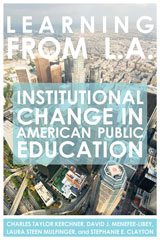Big Money and the School Board: An Annotation of a “L.A. Times” Op-Ed
Posted on | March 11, 2013 | Comments Off on Big Money and the School Board: An Annotation of a “L.A. Times” Op-Ed
[This story has also been posted at Ed Source.]
The Los Angeles Times Monday printed an op-ed piece I wrote about last week’s school board election, where a coalition of deep pockets givers spurred by Mayor Antonio Villaraigosa spent over $63 per vote. It was not only big money but also money badly spent. (Read the whole article.)
The 800-word limit for op-eds is about double the normal readership attention span, but it doesn’t allow much amplification of the basic points.
One point I raised was the crafting of a Democratic alternative to the Republican position on teachers unions, which is largely that they should be weakened by restriction on bargaining rights. Generally, this is done by limiting the scope of bargaining or the ability to collect union dues.
Unions fight these restrictions hard, as they should: witness the failed recall election against Gov. Scott Walker in Wisconsin.
Meanwhile, the political division among the self-styled reformers and the unions continues. Both call themselves Democrats. The list includes mayors, such as Villaraigosa and Chicago’s Rahm Emanuel. New York Mayor Michael Bloomberg, now registered as an independent, contributed $1-million to last week’s Los Angeles Unified School District board election.
The logic of the reformers seems to be that teacher unions are so wrongheaded, and the citizenry sufficiently tired of fights about seniority and teacher evaluation, that putting forward a slate of school board candidates is the way to change the balance of power in the school district and mute the pesky union.
But the strategy hasn’t worked. Not in L.A., not in Washington, D.C., not in Chicago.
In the op-ed piece, I suggested changing strategy. Instead of attacking the unions via the school board, rewrite labor law so that it makes unions responsible for education quality.
This issue needs lots of discussion, and I hope the op-ed will engender some, but the big point is that unions now do what the law requires of them. They negotiate wages, hours, and conditions of employment. Nothing requires them to negotiate educational quality.
During the 2012 presidential campaign, Mitt Romney characterized teacher unions as uncaring about education quality quoting the late American Federation of Teachers President Albert Shanker as saying “When school children start paying union dues, that’s when I’ll start representing the interests of children. ” Problem is, Shanker never said it, or at least no one can verify that he did. Actually, Shanker cared a lot about educational quality and spent at least the last decade of his life working to use unionism as a vehicle for change.
But the point is that unions are not empowered or required to represent the interests of children. Indeed, the construction of labor law crimps teacher professionalism. And the restrictions in labor law advocated by Republicans generally make teachers less professional rather than more. Remember: profession is a collective characteristic rather than an individual work ethic. Organized professions, not individuals, set training standards, codes of conduct, licensing regulations, and standards of practice.
So, how does one get labor law pointed toward supporting teacher engagement in standards setting?
Case law in labor relations divides the subjects of collective bargaining into three categories. There are mandatory subjects that require labor and employers to bargain in good faith. There are permissive subjects that can be bargained if both parties want. And there are forbidden or illegal subjects that may not be included in labor contracts.
But even among the mandatory subjects of bargaining, the employer is required to negotiate a topic only if the union raises it. So, the idea of a mandatory subject of agreement goes well beyond the current labor law tradition.
Why break with tradition and precedent?
The straightforward answer is that the state has a compelling legal and practical interest to make labor relations serve the goals of education. This interest extends beyond the original purposes of the National Labor Relations Act (of 1935 with subsequent amendments) on which most state statutes for teacher bargaining are based.
The state’s interest is larger than protecting the right of teachers to bargain and creating a fair and somewhat orderly playing field. The state’s compelling interest is to build a high quality teacher work force and high performing schools.
How teachers are evaluated is a very big part of that public interest.
There are three obvious legal alternatives. The first is the conservative and traditional path of removing evaluation or anything pertaining to it from collective bargaining, making evaluation a management prerogative. The second is to make evaluation a mandatory subject of bargaining so that employers are forced to negotiate the substance of teacher evaluation. The third, which I’ve advocated, is to require that all labor contracts contain a teacher evaluation agreement.
I don’t favor taking teacher evaluation off the bargaining table because, I believe organized teachers have a strong interest in creating and enforcing work standards and good insights in how to do that. In the places where strong peer review systems exist, unionized teachers have shown that they can balance due process protections with substantive standards and a willingness of teachers to enforce them, even to the point of dismissing incompetents.
Also, I don’t favor simply broadening the scope of bargaining. More than a few unions and school districts will duck the issue or trivialize evaluations in favor of job protection.
Instead, pass a law requiring evaluation in every labor contract. No contract, no raise, no salary advancement, no other contractual changes. The incentive for either labor or employer to use the politics of blocking disappears. Both sides would have an incentive to create well-crafted evaluations, and both would have an incentive to listen to the other.
• • • •
Readers who want a longer, more scholarly treatment of the scope of bargaining can look at an American Journal of Education article written with Julia Koppich or an article in the Harvard Journal of Law & Public Policy, written with Martin Malin.
Tags: Albert Shanker > Labor Law > Michael Bloomberg > Scope of bargaining > Teacher evaluation





